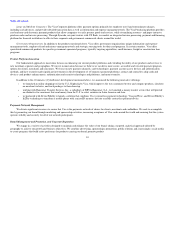Visa 2010 Annual Report Download - page 21
Download and view the complete annual report
Please find page 21 of the 2010 Visa annual report below. You can navigate through the pages in the report by either clicking on the pages listed below, or by using the keyword search tool below to find specific information within the annual report.
Table of Contents
We generally do not receive any portion of interchange reimbursement fees. They are, however, a factor on which we compete with other payments
providers and therefore an important determinant of the volume of transactions we process over our network. Consequently, changes to these fees can have a
substantial impact on our revenues. We have historically set default interchange reimbursement fees in the United States and other countries. However, in
certain jurisdictions, interchange rates and related practices are subject to increased government regulation. Increased regulatory scrutiny in the United States
has already resulted in limitations on our ability to establish default interchange rates in the debit area. See—The U.S. Wall Street Reform and Consumer
Protection Act may have a material adverse impact on our revenues, our prospects for future growth and our overall business. In addition, interchange rates
have become subject to increased scrutiny elsewhere, and regulatory authorities and central banks in a number of jurisdictions have reviewed or are reviewing
them. These include Australia, Canada, Brazil and South Africa.
If we cannot set default interchange rates at optimal levels, issuers and acquirers may find our payments system unattractive. This could materially
lower overall transaction volumes. It could also materially increase the attraction of closed-loop payments systems—those with direct connections to both
merchants and consumers—and other forms of payment. In addition, issuers could begin to charge higher fees to consumers. This would make our card
programs less desirable and reduce our transaction volumes and profitability. Acquirers could elect to charge higher discount rates to merchants, regardless of
the level of Visa interchange, leading merchants not to accept cards for payment or to steer Visa cardholders to alternate payment systems. In addition, issuers
and acquirers could attempt to decrease the expense of their card programs by seeking incentives from us or a reduction in the fees that we charge. Any of the
foregoing could have a substantial, adverse impact on our financial condition, revenues, results of operations, prospects for future growth and overall
business.
The U.S. Wall Street Reform and Consumer Protection Act may have a material, adverse effect on our financial condition, revenues, results of
operations, prospects for future growth and overall business.
The Wall Street Reform and Consumer Protection Act recently enacted in the United States includes provisions that will regulate the selection of
payment networks by issuers and the routing of debit transactions by retailers. This may result in the routing of debit transactions onto competing networks,
potentially reducing the processing fees we earn on debit transactions.
The legislation also establishes regulation and oversight by the U.S. Federal Reserve Board of debit interchange rates and certain other network industry
practices. In addition, the Federal Reserve now has the power to regulate network fees to the extent necessary to prevent evasion of the new rules on
interchange rates.
The act also created a new independent Consumer Financial Protection Bureau within the Federal Reserve System. The bureau will assume
responsibility for most federal consumer protection laws in the area of financial services and will have new authorities with respect to consumer issues. The
bureau's actions may make payment card transactions less attractive to card issuers. This could result in a reduction in our payments volume and revenues.
The new legislation may have a material, adverse impact on our financial condition, revenues, results of operations, prospects for future growth and
overall business. Failure by our clients or by us successfully to adjust our strategies to compete in the new environment would increase this impact.
20
























